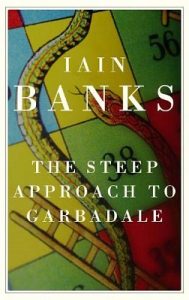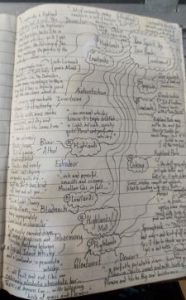
© Channel Four Films / PolyGram Filmed Entertainment
Today is November 30th, the feast-day of Andrew the Apostle, now better known as St Andrew, the national saint of Scotland. And seeing as it’s St Andrew’s Day, I will post another instalment of my guide to my favourite words in Scots, the dialect of Middle English still spoken in modern-day Scotland. Like Singlish, the unofficial fifth language of Singapore, there’s a good case for Scots to be considered a language of its own. Indeed, it’s been recognised as such by the Council of Europe’s Charter on Regional and Minority Languages.
In my previous entry, the words I covered began with ‘S’ and I only got as far as ‘snaw’. So here are the rest of the ‘S’-words.
Sneck (n) – the latch or catch used for fastening a gate. Actually, my trusty and much-thumbed copy of the Collins Pocket Scots Dictionary tells me that snib, the mechanism for securing the bolt on a door, is a Scots word too, though I’d always thought it came from standard English. Both sneck and snib can be used as verbs.
Soap dodger (n) – an unhygienic and un-fragrant person who has a deep aversion to soap, baths and showers. I looked up ‘soap dodger’ online and was told it was a general ‘British’ slang-word that appeared around 1990. But I’m sure I’d heard it in Scotland long before that – mainly by fans of arch-enemy Scottish football clubs Glasgow Rangers and Glasgow Celtic, who used it as a term of abuse for each other.
Sodger (n) – a soldier.
Sonsie (adj) – plump, rosy and healthy. This adjective appears in the opening lines of Robert Burns’ poem about Scotland’s premier foodstuff, Address to a Haggis (1786). Saluting the bulging-with-sheep’s-offal haggis, he writes: “Fair fa’ your honest, sonsie face / Great chieftain o’ the puddin-race!“
Sook (n) – nothing to do with an Arabic marketplace or commercial district, a sook is a person who sucks up to, those in authority. The term is commonly used for school pupils who grovel shamelessly before their teachers. However, the whole obsequious, cap-doffing, belly-crawling, brown-nosing British establishment could be described as ‘sooks’ because of their behaviour towards the Royal Family.

© Mainstream Publishing
Meanwhile, in his book Scots – The Mither Tongue (1986), Billy Kay identifies the first great sook in history as being James Boswell, the companion, biographer and toady of Dr Samuel Johnson, who was perfectly happy to pander to the Doctor’s anti-Scottish prejudices even though he was Scottish himself. (“I do indeed come from Scotland,” he whined when he first met Johnson. “But I cannot help it.” To which the Doctor snorted contemptuously, “That, Sir, I find, is what a very great many of your countrymen cannot help.”)
Souch (v) – a verb denoting the activity of the wind when it blows in a noisy fashion.
Souter (n) – a shoemaker or cobbler. Famously, Burns used the word as a nickname for a character – a cobbler by trade – in his magnum opus Tam O’Shanter (1791). Souter Johnnie is a drinking buddy of the poem’s titular, dissolute hero. Early in the poem, we see Tam in the pub with “…at his elbow, Souter Johnnie / His ancient, trusty, drouthy cronie / Tam lo’ed him like a very brither / They had been fou for weeks thegither.”
Also, at school, I had a teacher called Mr Souter. But I won’t crack the obvious joke about him talking ‘a lot of cobblers’.
Spaewife (n) – a woman who tells fortunes. The Spaewife is the name of an 1885 poem by Robert Louis Stevenson, in which the narrator plies a spaewife with all manner of philosophical questions (“Hoo a’ things come to be whaur we find them when we try…”, “Why lads are a’ to sell an’ lasses a’ to buy…”, “The reason o’ the cause an’ the wherefore o’ the why…”). However, he keeps getting brushed off with the glib answer, “It’s gey an’ easy spierin’.” (“It’s very easy asking.”)
Spaver (n) – a trouser zip or fly. The now-defunct online Doric Dictionary showed how the word was used with this eye-watering example-sentence: “Help, mither, av nipped ma tadger in ma spaver!”
Speir (v) – as the quote from Stevenson’s The Spaewife indicates above, this means to ask.
Spurtle (n) – a long wooden utensil once used in Scottish cooking, sometimes a spatula for turning over oatcakes, sometimes a stick for stirring porridge. I can’t recall the name of the story it was in, but I vividly remember reading a description of a sheep’s carcass lying on a Scottish hillside with its four stiff legs “sticking up like spurtles”.
Square go (n) – a face-to-face brawl where neither opponent carries a weapon nor has any advantage over the other. Inevitably, this term is used by the psychotic Frank Begbie in Irvine Welsh’s Trainspotting (1993), during his account of a fight he got into in a poolroom: “…this hard c*nt comes in. Obviously f*ckin’ fancied himself, like. Starts staring at me. Lookin’ at me, right f*ckin’ at me, as if to say, ‘Come ahead, square go.’ You ken me, I’m not the type of c*nt that goes looking for f*ckin’ bother, like, but…”

From wikipedia.org / © Moncrief
Stairheid (n) – the top of a flight of stairs. Long ago in urban Scotland, when much of the working-class population lived in close proximity in one or two-bedroom flats in tenement buildings, accessed by steep, stone stairs, a stairhead rammy was what you got when two neighbours – often female – had a falling-out and came to blows.
Stave (v) – to incur an injury by spraining or twisting a limb or digit.
Steamin’ (adj) – one of the many adjectives in Scots for describing a drunk person. (Others include arsed, bevied, bleezin’, blootered, buckled, fou’, gubbered, hingin’, minced, mingin’, miraculous, miracked, mortal, reekin’, reelin’, stocious and wellied.) Steamin’ also spawned the word steamboats: “By the end o’ the night I wis absolutely steamboats!”
Stoater (n) – a person or thing that is especially wonderful, beautiful or excellent. “Donald Trump’s a stoater!” cried nobody in Scotland, ever.
Stob (n) – a wooden post, like one you’d find in a fence.
Stookie (n) – a plaster-of-Paris cast put around a broken limb.
Stour (n) – a black, grimy dust. I’ve seen ‘stour’ used to describe smoke, but it would have be foul, tarry smoke that leaves deposits of dirt over everything. Stourie is the adjective derived from stour.
In my Scottish hometown of Peebles, a stourie-fit – a ‘dusty-foot’ – was someone who wasn’t a native of the town but an incomer. Presumably, their wandering feet had collected much stour before they arrived in pristine, stour-free Peebles. And as the town is a wee bit clannish, your family might have to be settled there for a few generations before your feet were considered less stourie.
Stowed oot (adj) – packed with people. Many times in my youth, I tried to enter a social venue, only to be pushed back by a bouncer who snarled, “Ye cannae come in! We’re stowed oot awreidy!”
Stramash (n) – a disorderly commotion or argument. A word popularised by the late Scottish TV commentator Arthur Montford, famous for his extravagantly checked jackets, who would rarely let a football match go by without referring to some sort of stramash breaking out in the penalty box.

© One Little Indian
Stushie (n) – a disagreement or row, perhaps not quite of the violent character of a rammy or a stramash. Years ago, In 1992, I remember somebody Scottish remarking on how there’d been “a stushie aboot thon song Ebenezer Goode by the Shamen” (whose chorus was the dodgy-when-heard-out-of-context ‘Ez-er Goode! Ez-er Goode!’). So maybe it approximates to a rumpus or uproar. Sadly, I have never heard people arguing bitterly over the bill for a platter of sushi, so I haven’t had the chance to cry poetically, “There’s a stushie about the sushi!”
Swallie (n) – a drink of alcohol, derived from the word ‘swallow’. A Scottish person offering you a tipple might ask, “Dae ye fancy a wee swallie?” Needless to say, a ‘wee swallie’ is usually anything but wee.
Sweetie wife (n) – not a female spouse who sells confectionery but a person who’s a gossip. Interestingly, the term sweetie wife is normally applied to a man, not a woman.
Swither (v) – to oscillate indecisively between various options or courses of action. During the Covid-19 pandemic, Boris Johnson swithered about whether or not he should impose lockdown on England, with disastrous and tragic results. Of course, Johnson is such a reptile he does something that rhymes with swither too.







